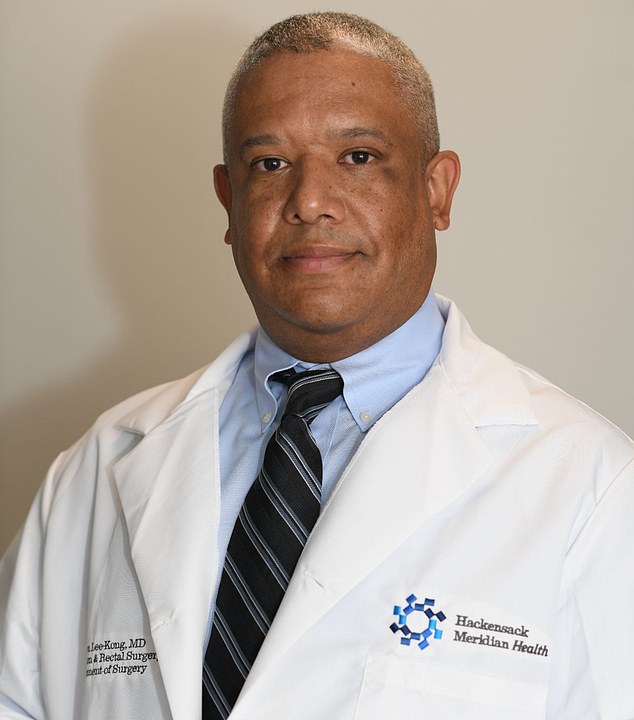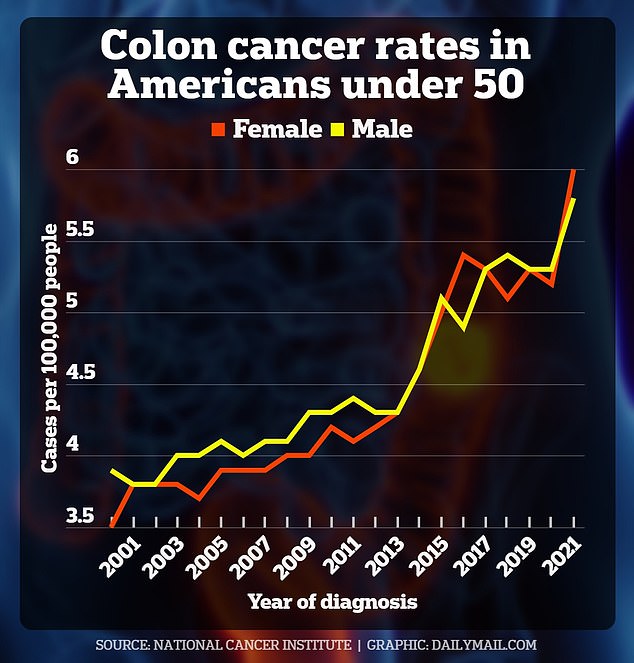A leading colon cancer doctor has revealed some New Year’s resolutions you could make to reduce your risk of contracting this deadly disease.
Dr. Steven Lee-Kong, head of colorectal surgery at Hackensack University Medical Center in New Jersey, told DailyMail.com that the first thing he would do is change or limit the use of certain cooking oils in 2025.
He explains: “Some studies, two of which were recently published, suggest that excessive consumption of seed oils, including corn oil, soybean oil, sunflower oil, safflower oil, and rosehip seed oil, Cotton, which are high in omega-6 fatty acids, can promote inflammation and potentially contribute to the development of colon cancer.
“The main concern is the oxidized forms of these oils, which are created during high-temperature cooking.”
Dr. Lee-Kong suggests sticking with olive oil, particularly extra virgin olive oil, as studies suggest they are “rich in monounsaturated fats and rich in antioxidants, along with anti-inflammatory compounds, which may have a protective effect.” against colon cancer.
However, he notes that “more research is needed to confirm all of these findings.”
But the expert said protecting against colon cancer doesn’t have to be all about restrictions.
In fact, his next goal is to go on vacation more. A vacation has the dual benefit of helping you de-stress while also exposing you to more immune-boosting vitamin D from the sun (if you’re going somewhere hot, that is!).
A leading colon cancer doctor has revealed ten New Year’s resolutions you could make to reduce your risk of contracting the deadly disease.
‘Some studies suggest a link between Vitamin D deficiency and an increased risk of colorectal cancer,” said Dr. Lee-Kong.
Harvard Medical School says that “animal studies have found that vitamin D appears to change the way tumors behave, affecting the biology of their cells and making them less aggressive or less likely to spread.”
To check that your vitamin D levels are healthy, Dr. Lee-Kong recommends making an appointment with your doctor for a blood test.
Your levels can then be supplemented if necessary, or a holiday may be just what the doctor ordered, as the sun is our best natural source of vitamin D.
However, Dr. Lee-Kong warns to be “conscious of sun safety” while soaking up the sun’s rays.
A vacation can also be a good way to reduce your stress levels.
Chronic stress, Dr. Lee-Kong points out, can “negatively affect the immune system and gut health.”
Researchers from China’s Sichuan University found that under frequent stress, a number of healthy bacteria living in the intestine begin to die, making it easier for cancer to enter.
They found that when these bacteria die, the tumors grow more rapidly, leading to more aggressive and fast-growing colorectal cancers.
To combat this chain of events, a getaway to the beach could serve as a quick solution.
Otherwise, Dr. Lee-Kong suggests “exploring stress reduction techniques such as meditation, yoga, or spending time in nature during 2025.”
Exercise is another powerful tool that can reduce stress, and Dr. Lee-Kong recommends it to keep your weight under control.

Dr. Steven Lee-Kong is the chief of colorectal surgery at Hackensack University Medical Center in New Jersey.
It highlights that ‘obesity is related to an increased risk of developing colorectal, liver, gallbladder, pancreatic, postmenopausal breast, ovarian, thyroid, kidney, uterine and esophageal cancer.’
In the United States, he says, an estimated 5 percent of cancers in men and 10 percent of cancers in women are related to overweight and obesity.
With this in mind, he says the New Year is a good time to “commit to losing weight if you’re overweight and staying active.”
r Lee-Kong says getting regular colon cancer screenings should be prioritized in the New Year.
Most people should start getting screened for colorectal cancer soon after turning 45 and then continue getting screened at regular intervals.
However, you may need to be tested before age 45, or more often than other people, if you have a family history of colon cancer or inflammatory bowel diseases such as Crohn’s disease.
Dr. Lee-Kong says colonoscopy “is the gold standard for detecting colon cancer in its early stages, saving lives.”

Next, the cancer expert suggests limiting alcohol consumption to one drink or less per day.
It highlights how studies in recent years have indicated that even moderate alcohol consumption has been linked to an increased risk of cancer.
The NIH states that moderate alcohol consumption has been linked to a 30 to 50 percent increased risk of breast cancer.
One study, conducted in Korea, also found that there was a 47 percent increased risk of colon cancer among moderate drinkers, while there was a 26 percent increased risk among men who consumed the same amount.
Staying on the topic of dietary changes, Dr. Lee-Kong says eating fewer processed foods in the New Year could be a good move.
He says, “I would definitely try to eliminate processed meat like bacon, salami, sausages, canned meat or chicken nuggets.”
“Numerous studies have shown that these foods can increase the risk of colorectal cancer and other types of cancer.”
A study published this spring by the Fred Hutch Cancer Center, in collaboration with the USC Norris Comprehensive Cancer Center, found that people who ate red and processed meat had a 30 and 40 percent increased risk of colorectal cancer, respectively.
In light of the findings, the US government has even proposed urging Americans to reduce red meat consumption and switch to plant proteins due to these health fears.


